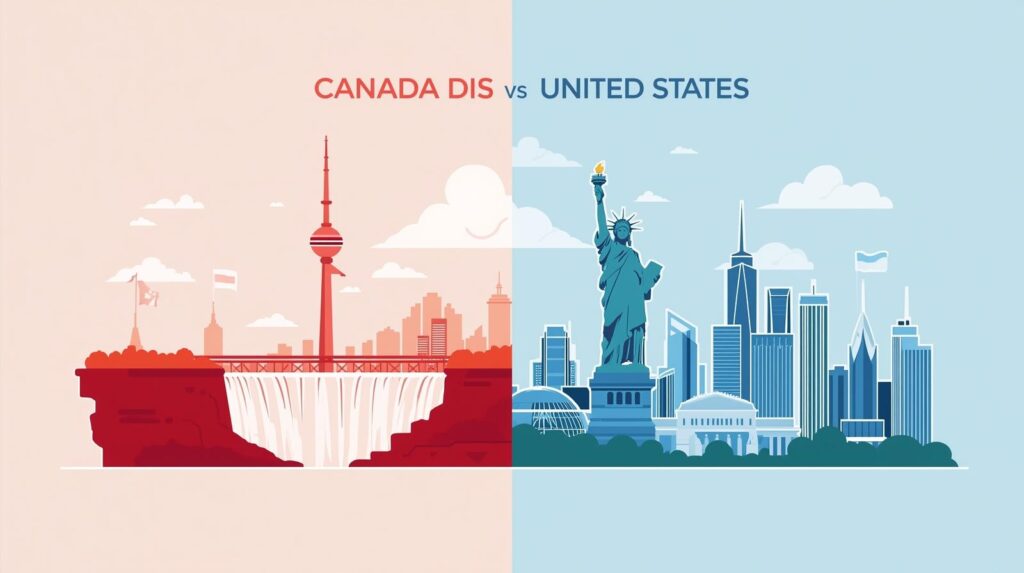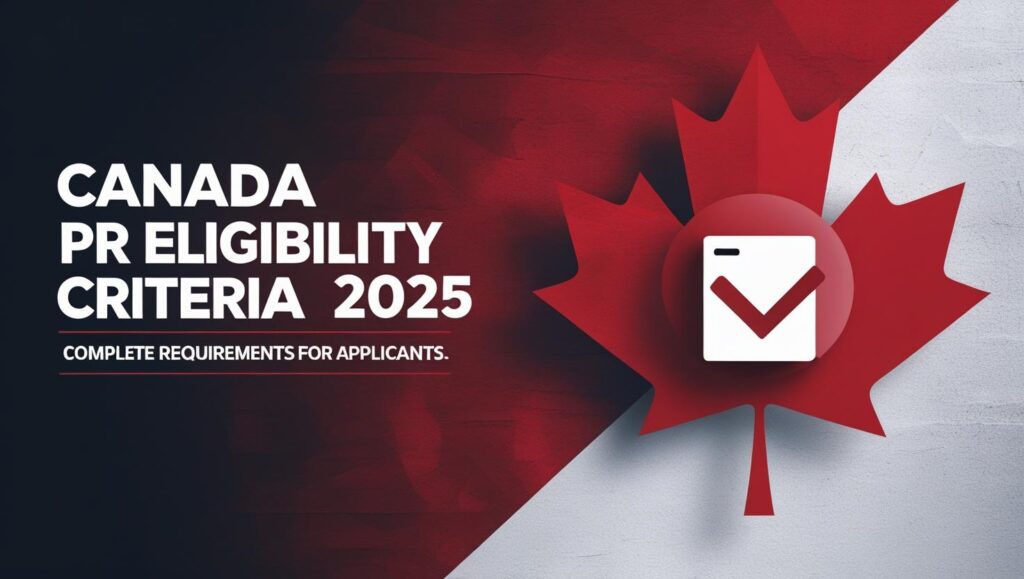When people think about North America, two countries stand out: Canada and the United States. They share the world’s longest border, close cultural ties, and strong economic links. But living, working, or studying in either country comes with key differences. If you’ve ever wondered how Canada vs United States compares in lifestyle, economy, healthcare, education, immigration, or culture, this guide will break it all down for you.
Geography and Population
Size and Landscape
-
Canada is the second-largest country in the world by land area, but most of its population lives near the southern border.
-
United States is slightly smaller in landmass but has a much larger population spread across diverse regions.
| Feature | Canada | United States |
|---|---|---|
| Land Area | 9.98 million sq. km | 9.83 million sq. km |
| Population (2024 est.) | ~40 million | ~335 million |
| Population Density | 4 per sq. km | 36 per sq. km |
Bottom line: Canada has more land and fewer people, while the US has a huge, diverse population.
Economy: Canada vs United States
The US economy is the largest in the world, while Canada ranks among the top ten.
-
United States: Known for innovation, tech hubs, and Wall Street influence. GDP exceeds $25 trillion.
-
Canada: Resource-rich economy with strong industries in energy, mining, and finance. GDP around $2.2 trillion.
Key differences:
-
Average salaries are higher in the US, but so are healthcare and education costs.
-
Canada provides more social benefits like universal healthcare.
Healthcare Systems
Healthcare is one of the biggest contrasts in the Canada vs United States debate.
-
Canada: Publicly funded healthcare (Medicare). Basic medical services are free, but wait times for specialists can be long.
-
United States: Healthcare is mostly private. Quality is excellent, but costs can be extremely high without insurance.
Example:
-
A broken arm in Canada: covered by public healthcare.
-
A broken arm in the US: can cost thousands of dollars without insurance.
Education
Primary and Secondary Education
Both countries have strong education systems, but Canada generally ranks higher in global education reports.
Higher Education
-
United States: Home to Ivy League and globally top-ranked universities, but tuition fees can exceed $50,000 per year.
-
Canada: World-class universities like University of Toronto and McGill. Tuition fees are lower for both domestic and international students.
Tip: International students often choose Canada for affordability and post-graduate immigration options.
Immigration Policies
Immigration is another big difference.
-
Canada: Points-based immigration system, encouraging skilled workers, students, and family reunification. Welcomes over 400,000 new permanent residents annually.
-
United States: Immigration is more complex and often limited by quotas, work visas, or family sponsorships.
Fact: Canada’s immigration policies are designed to fill labor gaps, while US immigration leans more toward family and employment sponsorship.
Cost of Living
| Category | Canada | United States |
|---|---|---|
| Housing | Cheaper in smaller Canadian cities; expensive in Toronto, Vancouver | Varies widely: affordable in Midwest, costly in New York, San Francisco |
| Healthcare | Mostly free but paid through taxes | Expensive without insurance |
| Education | Lower tuition | Higher tuition |
| Groceries | Slightly more expensive due to imports | Slightly cheaper |
Bottom line: Canada is often more affordable for families when healthcare and education are considered.
Culture and Lifestyle
-
Canada: Polite, multicultural, strong focus on community and outdoors.
-
United States: Fast-paced, diverse, individualistic, with strong entertainment and sports culture.
Example:
-
Canada celebrates hockey as a national sport.
-
The US dominates globally in basketball, baseball, and Hollywood movies.
Safety and Quality of Life
-
Canada often ranks higher in global safety, happiness, and quality of life indexes.
-
The US offers more economic opportunity but faces challenges like higher crime rates in some areas and higher inequality.
Political Systems
-
Canada: Parliamentary democracy with a constitutional monarchy (King represented by Governor General).
-
United States: Federal republic with presidential democracy.
Both countries have strong democratic institutions, but their systems operate differently.
Travel and Tourism
-
Canada: Famous for natural wonders like Niagara Falls, Banff, and the Northern Lights.
-
United States: Globally known for cities and landmarks like New York, Las Vegas, Grand Canyon, and Disney World.
If you love nature, Canada is unbeatable. If you want vibrant cities and entertainment, the US is unmatched.
Canada vs United States: Which is Better?
The answer depends on your priorities:
-
Choose Canada if: you want affordable healthcare, quality of life, and a welcoming immigration system.
-
Choose the US if: you want high-paying jobs, world-class universities, and a fast-paced lifestyle.
Both countries offer incredible opportunities, but one may suit your goals better.
FAQs about Canada vs United States
1. Which country has a better healthcare system?
Canada offers universal healthcare that is tax-funded, while the US has higher-quality facilities but much higher costs.
2. Is Canada safer than the United States?
Yes. Canada consistently ranks higher in safety, lower crime rates, and overall quality of life.
3. Which is cheaper to live in, Canada or the United States?
It depends on location. Overall, the US has cheaper housing in some regions, but Canada saves money with healthcare and education.
External Authoritative Links
Conclusion
When comparing Canada vs United States, the decision often comes down to lifestyle and personal goals. The US is a global powerhouse with endless opportunities, while Canada balances opportunity with social benefits and safety. Both have strengths worth considering.



